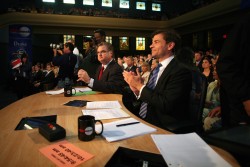 Questioner David Yepsen and Moderator George Stephanopoulos prepare to start the Aug. 19 Democratic presidential debate. |
Now the streets are all empty
Let the neighbors take the stage . . .
(with apologies to Jackson Browne)
The presidential debates at Drake University are over now, and the neighborhood can return to normal. Which means that Planet Sub and the Varsity Theater and DuBay’s, among other Drake-area establishments, can go back to serving Drake students, faculty and staff, and parking around campus can revert to summertime ease instead of the closed-off, limited-access-only madness of Sunday morning.
In the hours and days to come, pundits will endlessly speculate who
received the biggest bump from Sunday’s nationally televised debate on
ABC’s “This Week with George Stephanopoulos.” The answer, after Drake
flawlessly hosted the second such debate in three weeks — the first
one involved Republican candidates — is unquestionably the University,
as well as the neighborhood.
Nationally televised presidential debates tend to do that to a private
university in the capital city of the first state to make a selection
for the 2008 election.
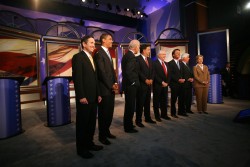 All eight Democratic presidential candidates share the Jordan Stage in Sheslow Auditorium. |
“If we were a little college in a tiny town, no, we wouldn’t have the
opportunity for the citizens of the state and the nation to be exposed
to the national implications of a presidential campaign,” says Art
Sanders, professor of politics and international relations. “But we are
fortunate enough to have that opportunity, and we as a university
should make the most of it.”
Drake won rave reviews as host of the debate from candidates and leaders of the Iowa Democratic Party, co-sponsor of the debate produced by ABC News and ABC5/WOI-TV.
“I have great memories of Drake from our last campaign,” John Edwards says. “This is a great university with great facilities and they have done a fine job at hosting this debate.”
“Everyone who has been a part of this has contributed immeasurably to the democratic — with a small-D — process,” says Scott Brennan, chair of the Iowa Democratic Party. “We’ve been so pleased that Drake University and ABC have gratefully fulfilled their roles as keeping people aware of the issues facing citizens in this election.”
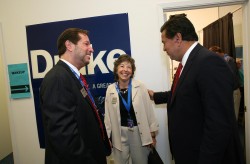 President David and Madeleine Maxwell welcome Bill Richardson to Drake. |
President David Maxwell notes several significant differences between
Sunday’s debate and the Republican debate Drake hosted on Aug. 5.
“This debate was a lot more involved than the Republican debate,”
he says. “For one thing, we had so many more media covering this
debate. For another, ABC used twice as many student volunteers for this
debate (40 as opposed to 20).
“Hosting an event like this is invaluable.
It introduces our students to a public role that they should be taking
an interest in. Some students have actually told me that this is why
they chose to come to Drake — so they could be part of this process
during an election year. It’s a singular opportunity that most students
never get to be a part of and most universities never get to be a part
of. It’s what a university should do.”
Renee Cramer, assistant professor of law, politics and society,
calls this opportunity a “citizen experience” that dovetails perfectly
with Drake’s mission to prepare students for meaningful personal lives,
professional accomplishments and responsible global citizenship as well
as professional accomplishments and meaningful personal lives.
“Absolutely, Drake is emerging as a major forum for presenting
issues to the public,” she says. “During non-election years we can be
doing that in other fields, not only politics,” Cramer adds on the
stage of Harmon Fine Arts Center, where media from all over the world
are interviewing political figures from all over the United States. “We
can engage business leaders, labor leaders, scientific leaders. The
role of academics is to be a public intellectual.”
Yet before dawn Sunday, hours before Stephanopoulos asks the first
question to the eight candidates, few people congregating on and around
University Avenue are thinking such lofty thoughts. In fact, Dogtown
resembles nothing less than a typical university town on a college
football Saturday.
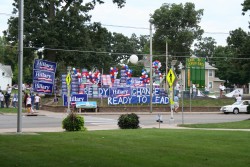 Supporters call attention to their candidates and causes with signs and cheers. |
Huge banners festoon utility poles and lampposts. Young people dressed in T-shirts touting their candidate outdo themselves in cheering, until the chants of “Hil-la-REE! Hil-la-REE!” and “OH!-Bah-ma, OH!-Bah-ma” and “Go John Go! Go John Go!” meld into a sleet storm of sound.
It’s like Relays Weekend, without the beer tents.
“We weren’t open for dinner during Relays Week,” says Tom Tully, co-owner of DuBay’s on 25th Street just north of the Varsity Theater. “So we missed that hoopla. But this is our biggest crowd of the year.”
The crowd comes courtesy of the John Edwards campaign, which paid the restaurant to host a pre-debate rally beginning at 5:30 in the morning. Hours earlier than that, DuBay’s chef, co-owner Brian DuBay, was on the premises, cooking up a scrambled egg dish that Edwards supporters could eat free, courtesy of the campaign.
Tully’s uncle is Rob Tully, former head of the Iowa Democratic Party and the Edwards campaign state chair. The restaurateur doesn’t apologize for his connections; you take your advantages where you can get them.
As outside, Edwards presses the flesh to about 150 well-wishers, a perspiring Tully inside estimates that about 300 people came in and out during the morning and about 200 stayed to watch the debate on a projection TV screen in the main dining room.
“Events like this are great for the neighborhood,” Tully says. “It brings people out where they can see how many changes have taken place, that there’s places to be on the east side of campus.”
Farther east of campus down University Avenue, where much of the recent
neighborhood revitalization has taken place, the lights of Planet Sub,
hosting a predawn, pretelecast rally for Illinois Sen. Barack Obama,
lit up the street. Raucous supporters welcomed each newcomer with a
rousing cheer.
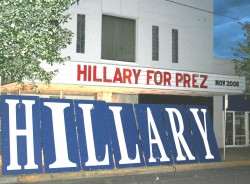 Sen. Hillary Clinton gets top billing at the Varsity Theater. |
“It’s, like, tailgate time!” exults Steve Logsdon, the 25-year-old
manager, whose father, Michael, attended Drake during the 1970s. “It
doesn’t hurt that students — especially newcomers — will see people
coming out to the neighborhood and will want to support neighborhood
business.”
B.C. Mahon, who runs the Varsity Theater, is more cautious. As he watches the Hillary Clinton campaign transform his movie house into a giant TV room to watch the debate, Mahon ponders his unique position as the dean of business in the area; he’s owned the neighborhood and Des Moines institution for decades and notes with approval the changes that have come.
“There’s been a lot of good happening here in the last few years,” he says, “and we won’t see the effects overnight. But an event like this can only help the neighborhood get better.”
As daylight dawns and Clinton supporters filter in, and onlookers who couldn’t get tickets to the debate congregate along the street, there’s an unmistakable feeling that for the Drake neighborhood, like the traditional Democratic Party theme song promises, happy days are here again.
To see more photos of the Democratic debate at Drake, visit the online gallery.
Jordan Oster, a junior majoring in history and politics, attended both debates and has been following the presidential campaigns on his blog, which can be found on the Drake Web site.

